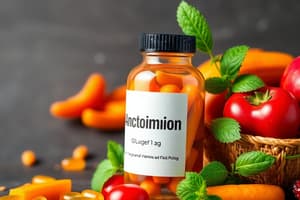Podcast
Questions and Answers
What is another name for vitamin C?
What is another name for vitamin C?
- Niacin
- Thiamine
- Ascorbic acid (correct)
- Riboflavin
Which vitamin is important for immune system health?
Which vitamin is important for immune system health?
- Vitamin A
- Vitamin D
- Vitamin E
- Vitamin C (correct)
Which function is NOT associated with vitamin C?
Which function is NOT associated with vitamin C?
- Promotes calcium absorption (correct)
- Aids in iron absorption
- Acts as an antioxidant
- Helps in protein metabolism
Vitamin C is a part of an enzyme needed for which process?
Vitamin C is a part of an enzyme needed for which process?
Which of the following roles does vitamin C play in the body?
Which of the following roles does vitamin C play in the body?
What is the primary function of most water-soluble vitamins?
What is the primary function of most water-soluble vitamins?
Which of the following is a precursor to vitamin A?
Which of the following is a precursor to vitamin A?
What can excessive consumption of vitamins A and D lead to?
What can excessive consumption of vitamins A and D lead to?
Which vitamin has a coenzyme function among the fat-soluble vitamins?
Which vitamin has a coenzyme function among the fat-soluble vitamins?
What is cholecalciferol also known as?
What is cholecalciferol also known as?
Which stage in the formation of Vitamin D3 involves sunlight?
Which stage in the formation of Vitamin D3 involves sunlight?
What forms when an enzyme binds to its substrate?
What forms when an enzyme binds to its substrate?
What term describes the number of molecules of substrate converted to product per enzyme molecule per second?
What term describes the number of molecules of substrate converted to product per enzyme molecule per second?
Which of these is a non-protein organic substance that is firmly attached to an enzyme?
Which of these is a non-protein organic substance that is firmly attached to an enzyme?
What is the role of amino acid side chains in the active site of an enzyme?
What is the role of amino acid side chains in the active site of an enzyme?
Which statement accurately describes a holoenzyme?
Which statement accurately describes a holoenzyme?
Which type of cofactor is loosely attached to the enzyme?
Which type of cofactor is loosely attached to the enzyme?
What is the active site of an enzyme?
What is the active site of an enzyme?
What is the protein portion of a holoenzyme called?
What is the protein portion of a holoenzyme called?
Which vitamin is important for nerve function and is part of an enzyme needed for energy metabolism?
Which vitamin is important for nerve function and is part of an enzyme needed for energy metabolism?
Which vitamin is crucial for normal vision and skin health?
Which vitamin is crucial for normal vision and skin health?
Which vitamin helps make red blood cells and is part of an enzyme needed for protein metabolism?
Which vitamin helps make red blood cells and is part of an enzyme needed for protein metabolism?
Which vitamin is essential for making DNA and new cells, especially red blood cells?
Which vitamin is essential for making DNA and new cells, especially red blood cells?
Which vitamin is important for the nervous system, digestive system, and skin health?
Which vitamin is important for the nervous system, digestive system, and skin health?
Which vitamin is part of an enzyme needed for making new cells and is important for nerve function?
Which vitamin is part of an enzyme needed for making new cells and is important for nerve function?
Which enzyme class catalyzes the transfer of electrons?
Which enzyme class catalyzes the transfer of electrons?
Which enzyme class catalyzes group transfer reactions?
Which enzyme class catalyzes group transfer reactions?
Which enzyme class is involved in hydrolysis reactions?
Which enzyme class is involved in hydrolysis reactions?
Which enzyme class catalyzes the formation of C-C, C-S, C-O, and C-N bonds by condensation reactions coupled to ATP cleavage?
Which enzyme class catalyzes the formation of C-C, C-S, C-O, and C-N bonds by condensation reactions coupled to ATP cleavage?
Which enzyme class transfers groups within molecules to yield isomeric forms?
Which enzyme class transfers groups within molecules to yield isomeric forms?
Which vitamin is also known as Riboflavin?
Which vitamin is also known as Riboflavin?
Which of the following is not a water-soluble vitamin?
Which of the following is not a water-soluble vitamin?
Which vitamin is known as Retinoids?
Which vitamin is known as Retinoids?
How many fat-soluble vitamins are there?
How many fat-soluble vitamins are there?
Which vitamin is classified as a hemopoietic vitamin?
Which vitamin is classified as a hemopoietic vitamin?
Which of the following is a non B-complex vitamin?
Which of the following is a non B-complex vitamin?
Which vitamin is also known as Cholecalciferol?
Which vitamin is also known as Cholecalciferol?
Which vitamin cannot be synthesized by humans?
Which vitamin cannot be synthesized by humans?
What happens to an enzyme when exposed to extreme pH levels?
What happens to an enzyme when exposed to extreme pH levels?
What is the role of the ionic character of amino acid side chains in enzyme structure?
What is the role of the ionic character of amino acid side chains in enzyme structure?
What is an effect of returning a gently denatured protein to normal physiological conditions?
What is an effect of returning a gently denatured protein to normal physiological conditions?
Which of the following enzymes is maximally active at an acidic pH of 2?
Which of the following enzymes is maximally active at an acidic pH of 2?
Which statement describes allosteric inhibition?
Which statement describes allosteric inhibition?
How does allosteric activation affect an enzyme?
How does allosteric activation affect an enzyme?
Where do effector molecules bind in allosteric regulation?
Where do effector molecules bind in allosteric regulation?
What happens to the enzyme-substrate complex during allosteric inhibition?
What happens to the enzyme-substrate complex during allosteric inhibition?
Which vitamin is essential for vision and immune system health?
Which vitamin is essential for vision and immune system health?
Which food source is a good provider of Vitamin D?
Which food source is a good provider of Vitamin D?
Which vitamin acts as an antioxidant and protects cell walls?
Which vitamin acts as an antioxidant and protects cell walls?
Which vitamin's precursor can be found in leafy, dark green vegetables?
Which vitamin's precursor can be found in leafy, dark green vegetables?
Which vitamin is involved in the proper absorption of calcium and is stored in bones?
Which vitamin is involved in the proper absorption of calcium and is stored in bones?
Flashcards are hidden until you start studying
Study Notes
Vitamins and Their Functions
- Ascorbic acid (vitamin C) is an antioxidant, essential for protein metabolism, immune system health, and iron absorption.
- Thiamine (vitamin B1) is part of an enzyme needed for energy metabolism and nerve function.
- Riboflavin (vitamin B2) is part of an enzyme needed for energy metabolism, important for normal vision and skin health.
- Niacin (vitamin B3) is part of an enzyme needed for energy metabolism, important for nervous system, digestive system, and skin health.
- Pantothenic acid is part of an enzyme needed for energy metabolism.
- Biotin is part of an enzyme needed for energy metabolism.
- Pyridoxine (vitamin B6) is part of an enzyme needed for protein metabolism, helps make red blood cells.
- Folate (folic acid) is part of an enzyme needed for making DNA and new cells, especially red blood cells.
- Cobalamin (vitamin B12) is part of an enzyme needed for making new cells, important for nerve function.
Extremes of pH and Enzymes
- Extremes of pH can denature enzymes, leading to loss of function.
- Enzymes can regain function when returned to normal physiological conditions.
Different Enzymes Have Different pH Optima
- Different enzymes have optimal pH ranges for activity.
- Examples: pepsin (maximally active at pH 2) and other enzymes (denatured at pH 2).
Allosteric Regulation
- Allosteric sites are effector binding sites on enzymes, distinct from the active site.
- Allosteric regulation can either inhibit or activate enzyme activity, depending on the effector molecule bound.
- Allosteric inhibition: binding of an inhibitor molecule to the allosteric site changes the conformation of the enzyme, making it less active or inactive.
- Allosteric activation: binding of an activator molecule to the allosteric site changes the conformation of the enzyme, making it more active.
Properties of Enzymes
- Enzymes have an active site that binds substrate, forming an enzyme-substrate complex.
- Enzymes are highly efficient, with the ability to transform substrate molecules into product at a high rate.
- Enzymes may associate with non-protein cofactors, such as coenzymes, prosthetic groups, or metal ion activators.
- Holoenzyme refers to the entire enzyme with its cofactor, while apoenzyme refers to the protein portion.
Vitamins
- Vitamins are essential for specific cellular functions.
- Most water-soluble vitamins are precursors of coenzymes for enzymes of intermediary metabolism.
- Vitamin D3 is formed in the skin from 7-dehydrocholesterol in a photochemical reaction driven by sunlight.
Classification of Vitamins
- Vitamins are classified as water-soluble or fat-soluble.
- Water-soluble vitamins: B-complex (9 vitamins) and vitamin C.
- Fat-soluble vitamins: vitamins A, D, E, and K.
Enzyme Classes
- Oxidoreductases: transfer of electrons (hydride ions or H atoms).
- Transferases: group transfer reaction.
- Hydrolases: hydrolysis reactions (transfer of functional groups to water).
- Lyases: addition of groups to double bonds or formation of double bonds by removal of groups.
- Isomerases: transfer of groups within molecules to yield isomeric forms.
- Ligases: formation of C-C, C-S, C-O, and C-N bonds by condensation reactions coupled to ATP cleavage.
Fat-Soluble Vitamins
- Vitamin A and its precursor, beta-carotene, are needed for vision, healthy skin and mucous membranes, bone and tooth growth, and immune system health.
- Vitamin D is needed for bone growth and immune system health.
- Vitamin E is an antioxidant that protects cells from damage.
- Vitamin K is necessary for blood clotting and bone health.
Studying That Suits You
Use AI to generate personalized quizzes and flashcards to suit your learning preferences.




